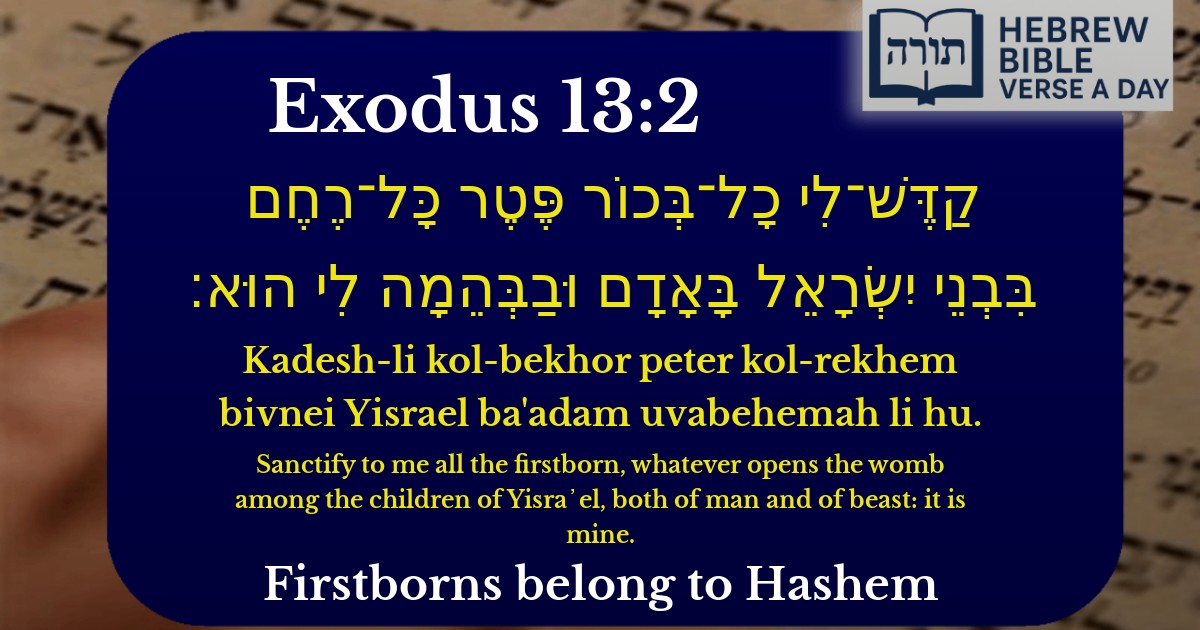Join Our Newsletter To Be Informed When New Videos Are Posted
Join the thousands of fellow Studends who rely on our videos to learn how to read the bible in Hebrew for free!
Hebrew Text
קַדֶּשׁ־לִי כָל־בְּכוֹר פֶּטֶר כָּל־רֶחֶם בִּבְנֵי יִשְׂרָאֵל בָּאָדָם וּבַבְּהֵמָה לִי הוּא׃
English Translation
Sanctify to me all the firstborn, whatever opens the womb among the children of Yisra᾽el, both of man and of beast: it is mine.
Transliteration
Kadesh-li kol-bekhor peter kol-rekhem bivnei Yisrael ba'adam uvabehemah li hu.
Hebrew Leining Text
קַדֶּשׁ־לִ֨י כׇל־בְּכ֜וֹר פֶּ֤טֶר כׇּל־רֶ֙חֶם֙ בִּבְנֵ֣י יִשְׂרָאֵ֔ל בָּאָדָ֖ם וּבַבְּהֵמָ֑ה לִ֖י הֽוּא׃
קַדֶּשׁ־לִ֨י כׇל־בְּכ֜וֹר פֶּ֤טֶר כׇּל־רֶ֙חֶם֙ בִּבְנֵ֣י יִשְׂרָאֵ֔ל בָּאָדָ֖ם וּבַבְּהֵמָ֑ה לִ֖י הֽוּא׃
🎵 Listen to leining
Parasha Commentary
📚 Talmud Citations
This verse is quoted in the Talmud.
📖 Bekhorot 2b
The verse is discussed in the context of the laws regarding the sanctity of firstborn animals and humans, and their redemption.
📖 Pesachim 96a
Referenced in a discussion about the sanctification of the firstborn and their role in the Exodus narrative.
📖 Zevachim 115b
Mentioned in relation to the sacrificial laws and the status of firstborn animals.


The Sanctity of the Firstborn
The verse (Shemot 13:2) commands the sanctification of every firstborn male among Bnei Yisrael, both human and animal. This mitzvah originates from the Exodus, where Hashem spared the firstborn of Yisrael during Makkat Bechorot (the Plague of the Firstborn) in Mitzrayim (Rashi, Shemot 13:2). The firstborn thus became consecrated to Hashem as a perpetual remembrance of this divine intervention.
Human Firstborns: Pidyon HaBen
For human firstborns, the Torah later designates the Kohanim to serve in their place (Bamidbar 3:12-13). As such, a firstborn son must be redeemed through the mitzvah of Pidyon HaBen (Redemption of the Firstborn) by giving five silver shekalim to a Kohen (Rambam, Hilchot Bikkurim 11:1). This ritual underscores that every Jewish firstborn inherently belongs to Hashem and requires symbolic redemption.
Firstborn Animals: Korbanot and Kedusha
Firstborn kosher animals (bechor tahor) were brought as korbanot in the Beit HaMikdash, while non-kosher animals (bechor tameh) were either redeemed or given to a Kohen (Chullin 11a). The Mishnah (Bechorot 2:1) details the laws of blemishes disqualifying a firstborn animal from sacrifice, emphasizing the high standard of kedusha required for offerings.
Theological Significance